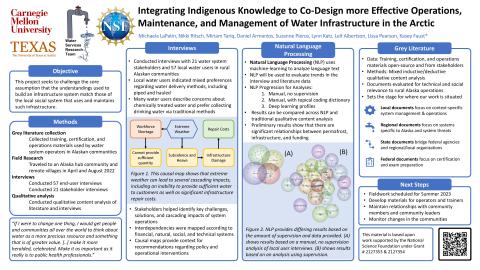Integrating Indigenous Knowledge to Co-Design more Effective Operations, Maintenance, and Management of Water Infrastructure in the Arctic
Rural Alaskan communities experience significant challenges in developing and operating water and sewer infrastructure systems. Their remote location, freezing temperatures, and regulatory hurdles often inhibit their ability to provide adequate water services. Moreover, engineered water systems are sometimes designed without using local knowledge and experience. Finally, training and certification requirements are often unreasonable and not suited to the local population, creating a gap in the local workforce. In this study, we examine drinking water system development and operations in the Yukon-Kuskokwim Delta region. We aim to improve water infrastructure operator trainings and certifications by connecting local knowledge to technical operations. Specifically, we are interested in understanding the potential role of indigenous and cultural practices in bettering the operation, maintenance, and management of water systems in rural Alaska. Our final objective is to use our technical knowledge with local practices to improve water infrastructure operations, maintenance, management, and communication between water infrastructure stakeholders. To achieve these objectives, the research team uses three key steps: (1) grey literature analysis, (2) end-user and stakeholder interview analysis, and (3) natural language processing. First, grey literature enables the team to evaluate the existing operator training materials, and identify the technical and social relevance of such documents. Next, interview analysis allows the team to incorporate local and indigenous knowledge into the analysis. In working with local experts, we can ensure that any recommendations are feasible and effective. Finally, natural language processing allows for an analysis of documents using machine-learning, which may be able to identify trends in the resources that would otherwise be missed.
